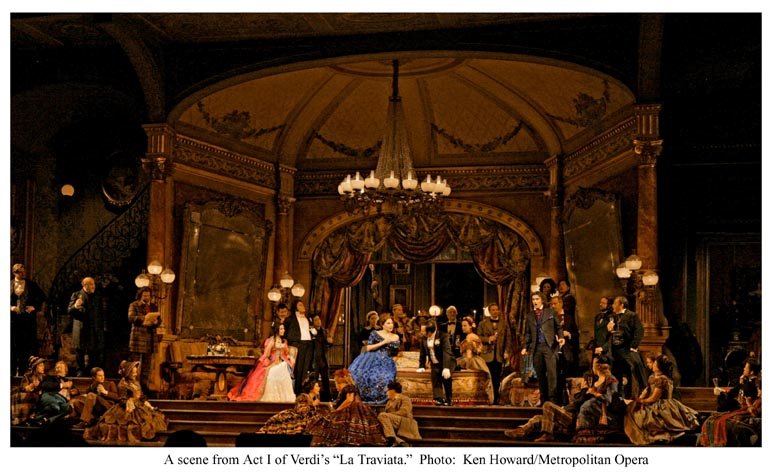|
|
|
|
|
|
|
|
| The Sun, February 6, 2006 |
| By JAY NORDLINGER |
Verdi: La Traviata, Metropolitan Opera House, 4 February 2006 (house
debut)
|
Verdi Would Be Proud
|
|
 On Saturday night, the Metropolitan Opera staged
one of the most anticipated cultural events of the season: Verdi's "La
Traviata," in the Franco Zeffirelli production. What's the big deal about
that? The Met stages this production every other day. Yes, but Angela
Gheorghiu has assumed the title role - for the first time ever at the Met.
It was in this role that the Romanian soprano had her world breakthrough in
1994: She sang it at Covent Garden, under Sir George Solti. On Saturday night, the Metropolitan Opera staged
one of the most anticipated cultural events of the season: Verdi's "La
Traviata," in the Franco Zeffirelli production. What's the big deal about
that? The Met stages this production every other day. Yes, but Angela
Gheorghiu has assumed the title role - for the first time ever at the Met.
It was in this role that the Romanian soprano had her world breakthrough in
1994: She sang it at Covent Garden, under Sir George Solti.
Miss Gheorghiu proved this weekend that she is justly famous in the role.
She has mastered it: vocally, theatrically, psychologically. Verdi did not
craft an uncomplicated role here, and he would smile at this star's
execution of it.
First to talk about is the singing that Miss Gheorghiu did on Saturday
night. She provided her usual beauty of sound, and her usual technical
control - almost spooky. The voice is a good weight for Violetta: light
enough to portray the fragile consumptive; strong enough to portray the
fiery courtesan. At times Miss Gheorghiu sounded a little small in this big
house - but you simply had to listen more carefully, and the orchestra had
to pipe down. In fact, with her lyrical, unforced, almost conversational
singing, Miss Gheorghiu drew you in.
She ripped through the coloratura in Act I. For those keeping score at home,
she did not sing the high E flat at the end of "Sempre libera." (Too bad, in
my opinion.) Her pitch was almost always spot-on, and this was especially to
be valued in exposed - and unaccompanied - passages ("E strano"). I have
said many times that this voice can seem more instrumental than vocal. This
is a hard thing to describe, but imagine a violinist: What he can do with
his fiddle, Miss Gheorghiu can sort of do with her voice. She plays it.
Through all three acts, she never strained or labored. Every page of the
part was governed by operatic judgment, or instinct. Miss Gheorghiu was duly
poignant - if ever a life were tragic, it's Violetta's - but not histrionic.
(Histrionics would have canceled out poignancy.) Her soft singing in "Dite
alla giovine" was riveting; her "Morro" was nearly terrifying.
It's said that, during one of those rehearsals in 1994, Solti confided, "I
was in tears. I had to go out. The girl [Miss Gheorghiu] is wonderful. She
can do anything."
"The girl" is the object of much derision, chiefly for her offstage antics,
or what those antics are reported to be. But she is a great singer, and a
great singing actress. As Marion Barry said after he was elected to a fourth
term as mayor of Washington, D.C.- this was following a stint in jail for
cocaine - "Deal with it."
There were other singers involved on Saturday night. The German tenor
Jonas Kaufmann was making his Met debut as Alfredo. First, he has what you
might call tenor-star looks: long hair, a Byronic profile. Second, he owns a
substantial, regal voice. Often it is creamy and refulgent. He was a little
tight in Act I - particularly in the Brindisi - but he opened up.
Alfredo's big aria is "De' miei bollenti spiriti," and Mr. Kaufmann
negotiated that well. But he dipped a little on that sustained final E flat.
He was also flat on a later high C - although the note was essentially
there. This was Angela Gheorghiu's night, but Mr. Kaufmann was not a
negligible presence.
And doing the honors as Germont was the British baritone Anthony
Michaels-Moore. He sang with assurance, and he conveyed the arc of his
character: sternness, tenderness, deep remorse.
If Mr. Kaufmann wasn't negligible, neither was the conductor, Marco
Armiliato. The orchestra played very well for him. The Prelude to Act I was
shimmering and beautiful; the Prelude to Act III was the same. Sometimes the
pit and the stage were not quite together, but nothing too awkward occurred.
In many spots, the orchestra seemed downright inspired: This was not another
day, another dollar, under another multi-syllabled Italian conductor. Mr.
Armiliato can be proud of what he brought about.
Finally, I might mention the audience: They coughed more than Violetta at
her sickest. In fact, there was so much coughing in Act III, you almost
couldn't hear Violetta at all. I half-expected Miss Gheorghiu to stop and
say, "Hey! I'm the one dying here!" But it's February, and what can you do?
You can do your best to stifle, that's one thing. |
|
|
|
|
|
|
|
|
|
|
|
|
|
|
|
|
|
|